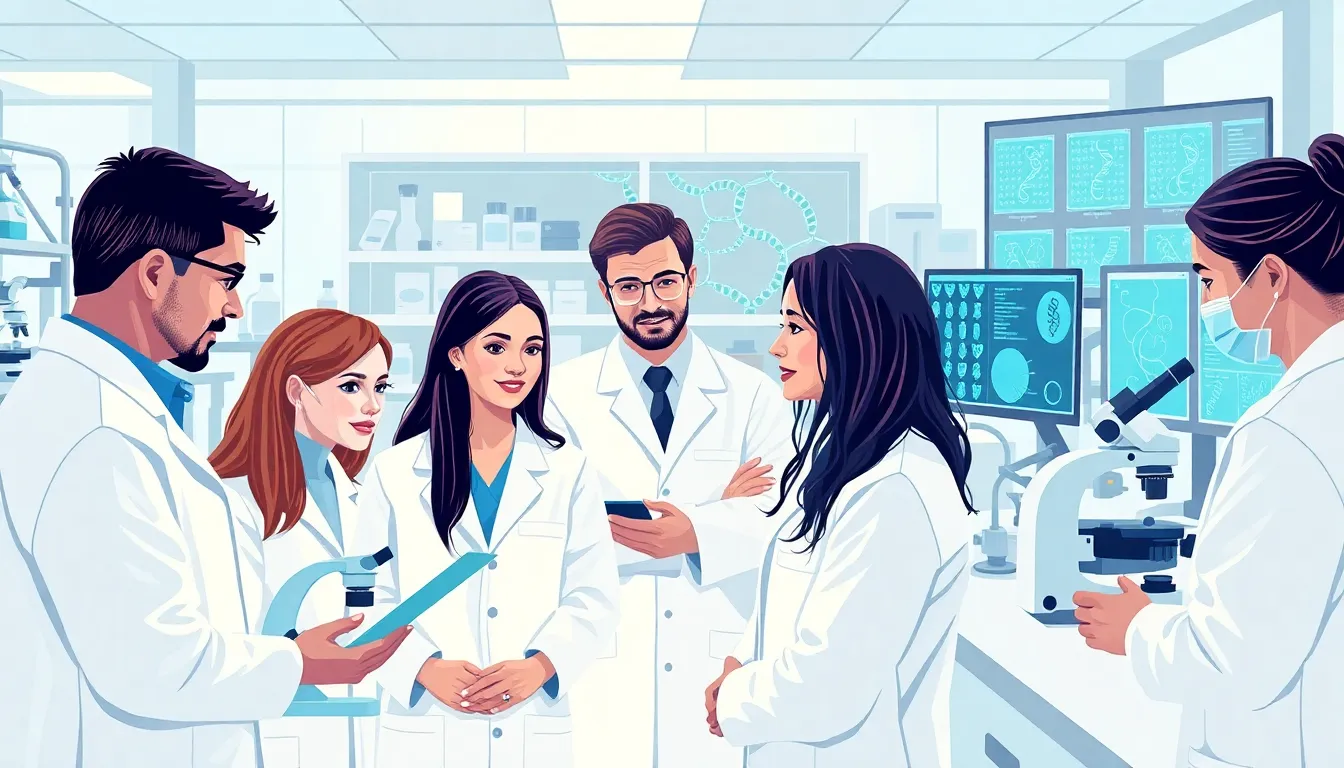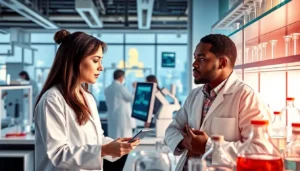Table of Contents
ToggleIn a world where science fiction often feels like reality, biotechnology is leading the charge in transforming health care. Imagine a future where diseases are tackled with the precision of a well-aimed laser beam, and treatments are tailored just for you—like a bespoke suit, but for your genes. Sounds like a plot twist from a blockbuster movie, right? Well, it’s happening right now!
Overview of Biotechnology and Health
Biotechnology plays a critical role in advancing health care. Researchers utilize biological systems and organisms to develop innovative solutions for medical challenges. Genetic engineering enables scientists to modify genes, paving the way for tailored therapies that target specific diseases.
Innovations in diagnostics enhance early disease detection. Techniques such as PCR (polymerase chain reaction) allow for the rapid identification of pathogens. Personalized medicine emerges from these advancements, where treatments are adjusted according to a patient’s genetic profile.
Vaccines benefit significantly from biotechnological advancements. The development of mRNA vaccines showcases the potential of biotechnology to respond quickly to emerging health threats. This technology demonstrated its effectiveness during the COVID-19 pandemic, marking a pivotal moment in vaccine development.
Therapeutics also evolve through biotechnology. Monoclonal antibodies provide targeted treatments for conditions like cancer and autoimmune diseases. These therapies exhibit greater efficacy and fewer side effects compared to traditional treatments.
Regenerative medicine exploits biotechnology to repair or replace damaged tissues and organs. Stem cell research presents exciting possibilities for conditions previously deemed untreatable. As research progresses, these methods could lead to revolutionary changes in patient care.
Clinical trials benefit from biotechnology as well. Advanced biostatistical methods improve trial design and data analysis. Success rates increase through these refined processes, ultimately leading to safer and more effective therapies.
Biotechnology transforms the health care landscape. Each advancement brings forth new opportunities to enhance patient outcomes, making the future of medicine more promising than ever.
Applications of Biotechnology in Medicine

Biotechnology significantly impacts medicine through multiple applications. These advancements improve patient outcomes across various therapeutic areas.
Drug Development
Drug development relies heavily on biotechnological processes. Researchers utilize recombinant DNA technology to create biologic drugs that target specific conditions. Monoclonal antibodies, for instance, provide precise treatment options for diseases such as cancer and autoimmune disorders. Speed plays a crucial role; biotechnology accelerates the development of investigational drugs through innovative methods like high-throughput screening. Additionally, adaptive clinical trial designs enhance the evaluation of drug efficacy, enabling faster access to groundbreaking treatments. Continuous breakthroughs in biotechnology nurture an environment where new and more effective therapies emerge.
Gene Therapy
Gene therapy represents a pioneering approach to treating genetic disorders. This biotechnological application involves delivering therapeutic genes directly into patients’ cells, addressing the underlying cause of diseases. Conditions like cystic fibrosis and hemophilia benefit from such targeted interventions. Delivery methods often include viral vectors, which efficiently transport genetic material into cells. Additionally, advancements in CRISPR technology allow precise editing of genomic sequences to correct mutations. Consequently, gene therapy opens new avenues for disease management and holds immense promise for curative therapies that were previously deemed unattainable.
Personalized Medicine
Personalized medicine tailors treatment plans to individuals based on genetic and molecular profiles. This approach utilizes biomarkers to identify which therapies are most effective for specific patient subgroups. Biotechnology facilitates the development of companion diagnostics that guide treatment decisions. Pharmacogenomics plays a vital role, ensuring patients receive medications that align with their genetic makeup. By integrating individual variation in genes and proteins, personalized medicine enhances therapeutic efficacy while minimizing adverse effects. As a result, biotechnology empowers healthcare providers to deliver more effective and customized solutions for patients.
Impact of Biotechnology on Disease Prevention
Biotechnology significantly contributes to disease prevention through innovative applications in vaccines and diagnostics. Enhanced approaches improve health outcomes and prevent the onset of diseases.
Vaccines and Immunotherapies
Biotechnology has revolutionized vaccines and immunotherapies. mRNA vaccine technology illustrates this shift, as it rapidly developed COVID-19 vaccines. Such vaccines employ a small piece of the virus’s genetic material to stimulate an immune response. This method allows for quick adaptation to emerging pathogens. Immunotherapies, including monoclonal antibodies, target specific disease pathways, providing tailored treatments for conditions like cancer. Research continually reveals new targets for immune modulation, broadening the range of diseases that can be treated effectively.
Diagnostic Tools
Diagnostic tools powered by biotechnology play a crucial role in early disease detection. Advanced techniques like next-generation sequencing enable precise identification of genetic disorders. These tools allow for the detection of pathogens through sophisticated methods such as PCR and CRISPR-based assays. Early detection improves treatment efficacy and outcomes, ensuring timely medical intervention. Moreover, liquid biopsies provide a non-invasive option for monitoring conditions like cancer by analyzing circulating tumor DNA. Such advancements enhance health care by empowering clinicians with accurate information for informed decision-making.
Ethical Considerations in Biotechnology
Ethical considerations significantly influence the development and application of biotechnology in health care. Conversations around biotechnology must address potential risks, benefits, and moral implications.
Regulatory Challenges
Regulatory challenges complicate the progress of biotechnological innovations. Approval processes for new therapies, especially those involving gene editing, can be extensive. Agencies like the FDA and EMA ensure safety, but long timelines may delay access to effective treatments. Diverse guidelines across regions add further complexity, creating a patchwork system that can hinder research. Challenges materialize when balancing innovation speed with public safety, leading to calls for harmonization in regulatory standards. Stakeholders continue advocating for streamlined procedures to enhance patient access while maintaining rigorous safety protocols.
Public Perception
Public perception shapes the acceptance and implementation of biotechnological advancements. Concerns about genetic modification and ethical implications may lead to skepticism. Many individuals express fears about long-term consequences of biotechnological interventions, particularly regarding health and environmental impacts. Transparency in communication fosters trust, with education playing a crucial role in alleviating fears. Engaging the public in discussions can clarify misconceptions. Furthermore, highlighting successful case studies in biotechnology encourages acceptance and supports informed decision-making. Public understanding directly influences policy-making and the future landscape of biotechnology in health.
Future Trends in Biotechnology and Health
Biotechnology’s evolution continues to shape health care. Innovations now focus on enhancing patient outcomes and streamlining treatments.
Emerging Technologies
CRISPR technology leads advancements in gene editing, allowing precise alterations of DNA. Artificial intelligence enhances drug discovery by analyzing vast datasets for hidden relationships. Wearable health devices monitor real-time biometrics, providing valuable insights into individual health status. Point-of-care diagnostics improve accessibility to testing, enabling faster responses to health issues. Collaborations between robotics and biotechnology present possibilities for automated surgeries, maximizing accuracy while minimizing recovery time.
Global Health Initiatives
Global initiatives prioritize biotechnology to address pressing health challenges. Collaborative efforts focus on vaccine distribution and manufacturing capacity to combat pandemic threats. Gene therapy research garners attention, targeting genetic disorders prevalent in specific populations. Public-private partnerships enhance access to essential medicines through sustainable practices. Organizations increasingly emphasize biodegradable materials in pharmaceutical packaging, aiming to reduce environmental impact while maintaining health safety.
Biotechnology is reshaping health care in unprecedented ways. With innovations in gene therapy diagnostics and personalized medicine it’s paving the path for a future where treatments are tailored to individual needs. The rapid development of technologies like mRNA vaccines and advanced therapeutics showcases the potential to combat diseases more effectively than ever before.
As the field continues to evolve ethical considerations and public perception will play crucial roles in its acceptance and application. Ongoing dialogue and transparency are essential to foster trust and understanding. The integration of biotechnology into health care not only promises improved patient outcomes but also heralds a new era of medical advancements that could redefine how society approaches health and wellness.



